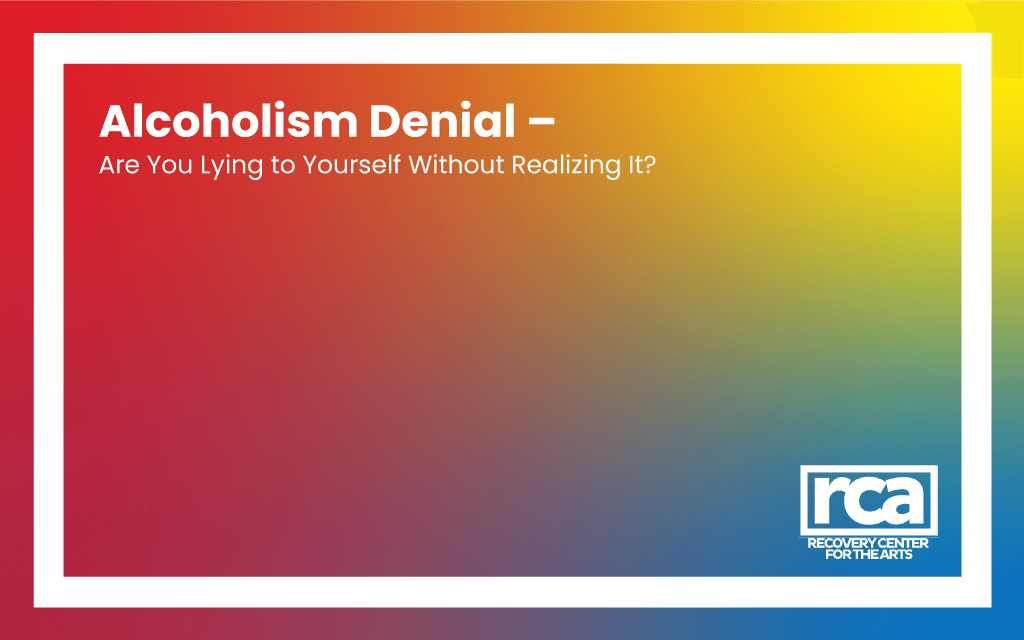
“Denial is a wicked drug.
It's addictive like Crack Cocaine.
I’ve watched people smoke it fiendishly
in an attempt to ignore heartache and pain.”
- from “Denial Is a Wicked Drug” by Charles A. Green
Why do we lie to ourselves? Is it to protect our feelings, even if it’s only temporary? Are we afraid of not being perfect? Are we worried that our flaws mean we can’t reach the goals we so desperately want?
Maybe we feel like if we lie often enough, eventually, it’ll become the truth.
Denial is a very real thing, and it isn’t just exclusive to alcoholism denial. Our team at Recovery Center for the Arts has seen how denial can lead to heartache for individuals and their families, too. We’ve seen the damage it does to people’s passion, and we want to help remedy that.
One of the ways we can do this is through education. Having a better understanding about alcoholism denial and why it happens allows people to spot it and have a higher motivation to seek healing. Our blog is going to answer your questions and help you learn how to address denial within yourself, too.
Are You Being Honest With Yourself About Your Alcohol Use?
Have you ever said the phrase, “I can stop whenever I want,” when someone asks you about your drinking? When someone says that, how often is it true and how often is it a lie? What if the person saying it thinks it’s true but it actually isn’t – is that also a lie?
Many people who have an alcohol use disorder don’t recognize how thoroughly it’s impacting their lives until something severe happens. There’s a reason for this. Alcohol use disorders (AUDs) don’t suddenly happen, they develop over time. This can make it harder to notice the changes that come with an AUD.
During this blog, take the time to be open and honest with yourself. Put aside your fears and opinions on what “defines” someone with an alcohol use disorder. Let’s take a deeper look at why denial happens and what you can do to work through it.
Why Might Someone Be in Denial About Their Alcohol Use Disorder?
Besides simply not recognizing their alcohol use disorder, what other reasons do people have for denying it? Is it mostly because they’re unaware of how deeply it’s impacting them, or are there people who know they have an AUD but deny it anyway?
The biggest contributing factor to denial stems directly from the stigma surrounding alcoholism and alcohol use disorders. This stigma leads to misconceptions about what an alcohol use disorder looks like, and it leads to people burying their side effects out of shame.
The root cause of denial is a lack of understanding about the truth of alcohol use disorders.
External Vs. Internal Alcoholism Denial
Denial isn’t strictly something that comes from within. In the case of those managing an alcohol use disorder, denial can also stem from those closest to them.
Loved ones often say things like:
“They’re doing great at their job, so they can’t be an alcoholic.”
“They don’t drink that often, so they can’t have an alcohol use disorder.”
“They’ve never been violent when they’re drunk, so surely they don’t have an alcohol use disorder.”
Whether they’ve known someone else with an alcohol use disorder before, and their loved one doesn’t show the same side effects, or their information comes from media and other incomplete sources, denial from loved ones is very real. This can either reaffirm their loved one’s own denial or make it harder for the loved one to want to talk with them about what they’re experiencing.
There is no “one-size-fits-all” example of someone who has an alcohol use disorder. People with AUDs aren’t always older men with beer guts, or aggressive drunks who abuse their spouses. People with AUDs can be successful in their careers and be good at budgeting. Doing away with stereotypes and expectations and looking, instead, at your situation specifically and how you’re being impacted can go a long way in helping overcome denial.

How to Recognize Alcoholism Denial
The main way you can recognize alcoholism denial is by first determining if there’s something to deny in the first place.
Because of the stigma surrounding alcohol use disorders, there are many misconceptions about what does and doesn’t define the condition. Someone may look at another person and assume they have an AUD when they actually don’t. Other times someone may seem “perfectly fine” but they’re actually managing an AUD.
The primary symptoms of an AUD come from behaviors more than physical side effects. This can make them both more noticeable but also can make them harder to trace to your alcohol use specifically. Some people incorrectly connect these behavioral changes to things like stress, depression, and more which can also contribute to alcoholism denial.
The Signs and Symptoms of an Alcohol Use Disorder
Whether you’re looking to determine if you have an alcohol use disorder, or if a loved one does, the easy way to do so is by asking a couple of questions.
Within the past year, have you experienced any of the following?
- Have you had times when you drank more than you planned to, or for longer than planned?
- Have you tried to stop drinking before, but experienced cravings or withdrawal symptoms when you did?
- Have you needed to drink more than you used to in order to experience the effects you want?
- Have you continued drinking even if drinking has caused you problems with your family or friends?
- Have you, more than once, gotten into unsafe situations because of drinking? (I.e. drinking while driving, engaging in unsafe sex, etc.)
- Have you continued drinking despite experiencing a worsening in symptoms of depression or anxiety?
- Do you spend most of your day revolving around alcohol? (This includes time spent thinking about drinking, engaging in drinking, and recovering from drinking.)
- Have you started cutting back on other activities and hobbies you used to enjoy in order to spend time drinking instead?
- Have you tried or wanted to cut back on drinking before but were unable to?
These questions are the ones laid out by the Diagnostic and Statistical Manual of Mental Disorders, Fifth Edition that are used to determine the severity of a person’s AUD. If you answered yes to some of the questions above, it might be time to consider what your relationship with alcohol truly is.
How to Come to Terms With Your Alcohol Use – Tips for Working Through Denial
Even if you’ve come to realize that you might have an alcohol use disorder, whether you realized it through this blog or otherwise, that doesn’t mean the experience of alcohol denial goes away overnight. It’s not easy to come to terms with the fact that your relationship with drinking isn’t what you thought it was. It can be even harder to think that you might need help and support in order to change your current situation.
During this time, it’s important to be kind to yourself. You don’t need to immediately be loud and open about your condition. You don’t have to suddenly become an advocate for yourself and others dealing with AUD. Yes, you may get to that point and even eventually want to do those things, but the first step on that journey is acceptance.
To help yourself with this process, take the time to learn more about alcohol use disorders and those who have them. It can be helpful to find others who’ve gone through recovery and ask them about their personal journey. They can offer tips and insight on how they got to their current point in recovery, and they can also help you feel less alone.
At the end of the day, just don’t rush yourself. Take the time to think it through and talk with those close to you about your circumstances. Healing is possible for everyone and you deserve kindness and support along the way.

Starting the Process of Healing From Alcohol Use in Arizona
When it comes to seeking rehab for alcohol addiction, where do you start? Are you going to find judgment or acceptance during the process? Is there a rehab center that offers compassion and long-term support?
It may seem daunting to take the first step, but there are options available here in Arizona that will provide the healing and support that you need. A dedicated team will work with you to discuss the options you have available, making a flexible plan that works in collaboration with you to adjust as your healing journey continues.
If you’re looking for a program that understands the creative soul and wants to help you find healing for your inner child, our team at Recovery Center for the Arts is here for you. We incorporate art in all forms into our treatment, so you can rediscover and grow your passions as part of your recovery. If you have any questions or want to get started today, just give us a call at (480) 386-1593.
Recovery Center for the Arts – Finding recovery through creativity.

